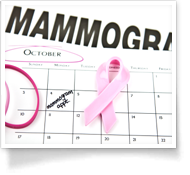eNewsletters
- October 2012

Chances are-you or someone you know-has been impacted by breast cancer. In the U.S. alone, 1 in 8 women receive a breast cancer diagnosis, and 40,000 women die from the disease annually according to the Centers for Disease Control. Although it's rare, men get breast cancer too, which is why every October, the organizers behind National Breast Cancer Awareness Month, intensity their efforts to let everyone know there are steps they can take to beat the odds. Here's how:
Early Detection - Medical experts recommend monthly self-exams to detect signs of breast cancer, such as a lump. However, in the early stages of breast cancer, a lump is hard to detect, and there aren't any other outward signs or symptoms. Therefore, a mammogram-an X-ray of the breast-is very important. The National Breast and Cervical Cancer Early Detection Program offers free or low-cost mammograms to eligible women. Women age 40 and above should talk to their doctors about when and how often to get a mammogram.
Reduce Your Risk Factors - Smoking raises your chances of getting breast cancer along with drinking alcohol, but did you know that a poor diet and even carrying a few extra pounds can raise your risk too? By maintaining a healthy weight and regularly exercising, you can lower your risk. The U.S. Department of Agriculture's website offers tips and nutrition recommendations on how to build a balanced diet on ChooseMyPlate.gov, and you and your family can take part in the Let's Move campaign led by First Lady Michelle Obama. Finally, share your family history with your doctor to help him/her determine when you should start getting mammograms and the frequency.
Benefits.gov features over 1,000 forms of government assistance with many programs focusing on healthcare, good nutrition, and exercise-all of which are key to preventing breast cancer and many other diseases. Click the "Start Now" button on the Benefits.gov homepage to use our free and confidential Benefit Finder.
|
The medical journal, Nature, published a breakthrough study on September 23, 2012, where researchers analyzed the genetics of cancer-finding four major classes of the disease. The medical community is very hopeful this could potentially lead to more effective drugs to treat the disease-read the full report now. |







